
Materiali e Discussioni per l Analisi dei Testi Classici
Scope & Guideline
Cultivating a Dialogue on Literary Heritage
Introduction
Aims and Scopes
- Philological Analysis:
The journal emphasizes the importance of philology in understanding classical texts, including textual criticism, emendation, and the study of manuscripts. - Intertextual Studies:
A significant focus on how classical texts interact with each other, exploring themes of reception, adaptation, and influence across different authors and genres. - Literary Theory and Criticism:
The journal incorporates various literary theories to analyze classical texts, examining narrative strategies, themes, and character development within their historical contexts. - Historical Contextualization:
Papers often explore the socio-political and cultural contexts in which classical texts were produced, enhancing the understanding of their significance and impact. - Innovative Methodologies:
The journal encourages the use of interdisciplinary approaches, integrating insights from linguistics, history, and cultural studies to enrich classical analysis.
Trending and Emerging
- Reception Studies:
There is a growing interest in how classical texts have been received and interpreted over time, indicating a trend towards understanding the ongoing relevance of these works in modern contexts. - Narrative Strategies and Literary Techniques:
Recent publications increasingly analyze narrative structures and literary devices within classical texts, reflecting a shift towards deeper literary analysis. - Emotional and Psychological Analysis:
Emerging themes include the exploration of emotions and psychological states in classical literature, indicating a trend towards understanding the human experience as portrayed in these texts. - Digital Humanities Approaches:
The integration of digital tools and methodologies in classical studies is becoming more prevalent, suggesting an openness to innovative ways of analyzing and interpreting texts. - Comparative Literature Perspectives:
There is a trend towards comparative studies that examine classical texts alongside other literary traditions, enhancing cross-cultural understanding and dialogue.
Declining or Waning
- Traditional Textual Criticism:
There has been a noticeable shift away from purely traditional methods of textual criticism towards more interdisciplinary approaches that incorporate broader cultural and theoretical frameworks. - Focus on Lesser-Known Texts:
The exploration of lesser-known or minor classical texts seems to be waning, as the journal increasingly highlights major canonical works and their adaptations. - Historical Linguistics:
The emphasis on historical linguistics and the evolution of language within classical texts is less frequently addressed, with more attention being paid to thematic and narrative analysis.
Similar Journals

Minerva-Revista de Filologia Clasica
Championing open access to classical philology.Minerva-Revista de Filologia Clasica, an esteemed academic journal published by the Universidad de Valladolid, is a pivotal resource in the fields of Classics, Linguistics, and Literature. With its ISSN 0213-9634 and E-ISSN 2530-6480, this journal has been championing open access since 2017, making high-quality research accessible to a global audience. Based in Valladolid, Spain, Minerva is dedicated to the exploration and dissemination of scholarly work related to classical philology, offering a platform for the exchange of ideas among researchers, educators, and students alike. Recognized in the 2023 category quartiles as Q3 in Classics and Q4 in Linguistics and Language, this journal provides valuable insights and contributes significantly to its fields, allowing authors and readers to engage with important discussions and innovative perspectives. As the academic landscape evolves, Minerva continues to adapt, fostering a vibrant community committed to the advancement of knowledge in antiquity and its linguistic dimensions.

RAMUS-CRITICAL STUDIES IN GREEK AND ROMAN LITERATURE
Exploring the Echoes of AntiquityRAMUS: Critical Studies in Greek and Roman Literature, published by Cambridge University Press, stands as a premier journal dedicated to the exploration and analysis of classical literary texts. Established in 2002, this journal has garnered recognition in its field, achieving a Q1 category ranking in both Classics and Literature and Literary Theory for 2023, which reflects its commitment to scholarly excellence. With an impressive Scopus ranking, where it places in the 76th percentile for Literature and Literary Theory and the 70th percentile for Classics, RAMUS is a critical resource for researchers, professionals, and students engaged in the study of ancient texts and their lasting impact on contemporary literature. Although currently not an open-access journal, it offers a wealth of peer-reviewed articles, reviews, and critical essays that enrich understanding and foster discussions in the realms of Greek and Roman literary traditions. This journal not only serves as an academic platform but also contributes to the ongoing dialogue on the relevance of classical literature in today's cultural and literary discourse.

Eirene-Studia Graeca et Latina
Exploring the Rich Tapestry of ClassicsEirene-Studia Graeca et Latina, ISSN 0046-1628, is a prominent academic journal published by the Institute of Classical Studies, Academy of Sciences of the Czech Republic. Focusing on the fields of Classics, Linguistics, and Archaeology, this journal serves as a vital platform for scholarly discourse and research dissemination since its inception in 2002. Although it operates under a traditional access model, the journal has established itself within the academic community, evidenced by its placement in the Q4 category across multiple disciplines in 2023. This includes significant rankings in areas such as Archaeology and Language and Linguistics, where it finds itself within the 27th to 16th percentiles of its respective categories. Eirene aims to foster the advancement of research in the Humanities, providing a rigorous forum for scholars and practitioners interested in classical studies. Its contribution to the academic landscape is essential for those who aspire to explore the depths of ancient languages, cultures, and methodologies, making it a valuable resource for researchers, professionals, and students alike.
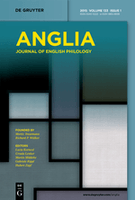
ANGLIA-ZEITSCHRIFT FUR ENGLISCHE PHILOLOGIE
Unveiling the Evolution of the English LanguageANGLIA-ZEITSCHRIFT FUR ENGLISCHE PHILOLOGIE, published by WALTER DE GRUYTER GMBH, stands as a significant periodical in the fields of Linguistics and Literary Theory. With a rich publication history dating back to 1878 and ongoing contributions until 2024, this esteemed journal serves as a vital resource for researchers, professionals, and students interested in the evolution of the English language and literature. Although it does not currently offer open access, its rigorous peer-reviewed articles have secured a respectable standing, ranking Q3 in Linguistics and Language and Q2 in Literature and Literary Theory as of 2023. The journal, located in Berlin, Germany, continues to drive academic discourse and foster scholarly engagement in the intricacies of English philology, making it an essential platform for the latest research and developments in the field.
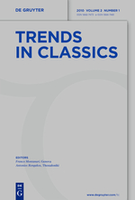
Trends in Classics
Exploring the enduring legacy of ancient cultures.Trends in Classics is a distinguished academic journal published by WALTER DE GRUYTER GMBH, dedicated to advancing the field of Classics through critical scholarship and innovative research. With an ISSN of 1866-7473 and an E-ISSN of 1866-7481, this journal offers a platform for scholars from around the globe to share insights on classical literature, history, and archaeology. Indexed in Scopus and awarded a respectable Q4 classification in Classics, it ranks 48th out of 170 in the Arts and Humanities category, placing it in the top 72nd percentile—an indicator of its growing influence and contribution to the field. Operating from Germany, specifically from Genthin Strasse 13, D-10785 Berlin, the journal spans converged years from 2009 to 2024, fostering ongoing dialogues and developments within classical studies. Although it does not currently offer open access, its commitment to scholarly excellence makes it a vital resource for researchers, professionals, and students alike, who seek to deepen their understanding of ancient cultures and their lasting impacts on contemporary society.

Filologia Mediolatina
Exploring the Depths of Medieval LatinFilologia Mediolatina is an esteemed academic journal dedicated to the study of Medieval Latin philology, published by SISMEL EDIZIONI GALLUZZO in Italy. With an ISSN of 1124-0008, this journal provides a critical platform for researchers, professionals, and students to explore the intricate relations between language, culture, and textual analysis in the medieval period. Although its impact factor is not specified, Filologia Mediolatina falls within the Q4 category in the Linguistics and Language field as of 2023 and holds a notable rank in the arts and humanities sector, highlighting its niche yet vital role in the academic community. The journal offers insights into linguistic evolution and historical texts, making it a valuable resource for those engaged in these disciplines. It has continued to publish relevant articles from 2015 to 2023, contributing to scholarly discussions and enriching the knowledge base in medieval studies.
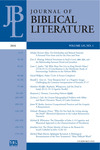
JOURNAL OF BIBLICAL LITERATURE
Illuminating Biblical Texts Through Literary Insight.The JOURNAL OF BIBLICAL LITERATURE, published by the Société Biblique de Littérature, is a premier academic platform dedicated to the interdisciplinary exploration of biblical texts through the lenses of literature and religious studies. With impressive Scopus rankings—placing it in the top 5% of journals in both Literature and Literary Theory as well as Religious Studies—the journal exemplifies quality and rigor in its scholarship. Despite its lack of open-access options, it is highly regarded for its contributions to scholarly discourse, aiming to enrich understanding of biblical literature within both historical and contemporary contexts. The journal operates within the elite Q1 quartile, underscoring its significance in the field and making it an essential resource for researchers, professionals, and students alike. Conveniently based in the United States, at 825 Houston Mill Rd, Suite 350, Atlanta, GA 30329, the journal is poised to continue impacting the scholarly landscape leading into its converged years from 2002 to 2024.
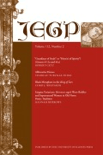
JOURNAL OF ENGLISH AND GERMANIC PHILOLOGY
Bridging Cultures Through Language and LiteratureJournal of English and Germanic Philology, published by University of Illinois Press, stands as a prestigious forum for scholarly discourse in the fields of linguistics and literary studies. With its ISSN 0363-6941 and an impressive impact factor aligning it within the Q1 and Q2 quartiles in key academic categories, this journal delves into nuanced explorations of both the English and Germanic languages, enriching the understanding of language and its literary frameworks. The journal aims to foster interdisciplinary dialogue, offering cutting-edge research that appeals not only to linguists and literary theorists but also to educators and cultural historians alike. Although the journal is not open access, its contributions are essential for anyone keen on enhancing their knowledge of linguistic phenomena and literary narratives from these influential linguistic traditions. With a commitment to publishing innovative and rigorous scholarship, the Journal of English and Germanic Philology is a vital resource for academics seeking to advance their work in language and literature.
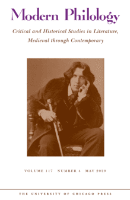
MODERN PHILOLOGY
Illuminating the Rich Tapestry of Modern PhilologyMODERN PHILOLOGY is a distinguished academic journal published by the University of Chicago Press, dedicated to the exploration and advancement of knowledge in the fields of cultural studies, linguistics, and literary theory. Having commenced its publication in 1905, the journal continues to foster scholarly discourse and innovation through rigorous research and critical analysis, making it a vital resource for researchers, professionals, and students alike. With an ISSN of 0026-8232 and a commendable Scopus ranking, including a 69th percentile in Literature and Literary Theory, MODERN PHILOLOGY occupies a significant position within its respective quartiles (Q4) in the 2023 assessments. Although the journal does not currently offer open access, it remains a crucial platform for contributions that interrogate the complexities of language and literature. As a leading publication in its field, MODERN PHILOLOGY invites submissions that challenge conventional paradigms, encouraging a fresh examination of texts, contexts, and cultural phenomena from 1996 through 2024 and beyond.

GYMNASIUM
Bridging Timeless Texts and Contemporary TeachingGYMNASIUM, published by Universitätsverlag C Winter Heidelberg GmbH, is an academic journal dedicated to the fields of Classics and Education. Since its inception in 1970, the journal has served as a platform for scholarly discourse, focusing on the intersection of classical studies and educational methodologies. Despite its discontinuation from Scopus coverage post-2021, GYMNASIUM remains an important resource for researchers, professionals, and students, fostering a deeper understanding of ancient texts and their relevance in contemporary educational frameworks. Current rankings place the journal in the Q4 quartile in both Classics and Education categories, reflecting its niche yet significant contribution to these fields. Researchers can access the journal's past issues through various academic libraries in Germany, enhancing interdisciplinary study and promoting scholarship across broader educational horizons.